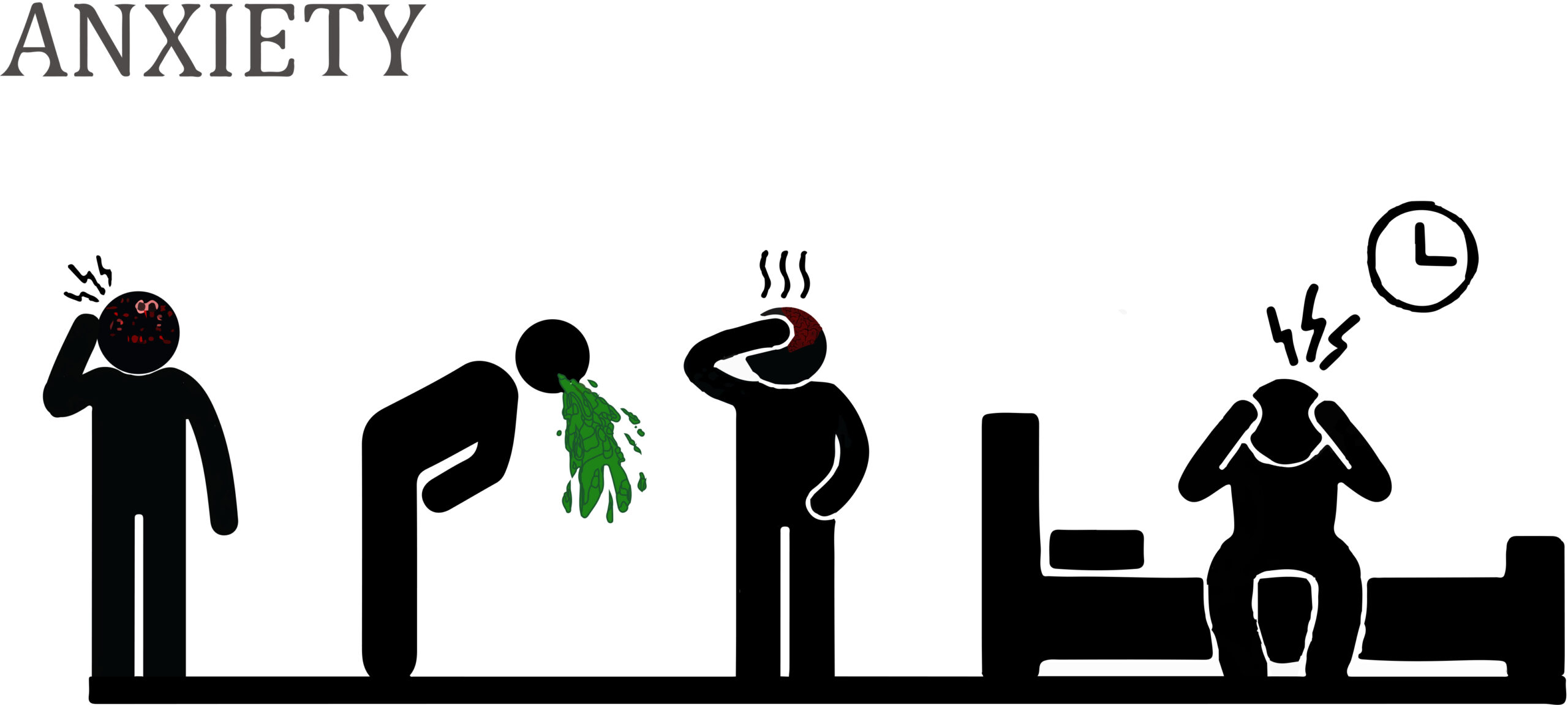Are Anxious Christians Bad Christians?
Anxiety is that unpleasant feeling of fear that impacts many of us. Globally, about 16.6% of people experience anxiety at some point in their life.1 It is common, and can even be beneficial to experience some degree of anxiety, especially when we are facing a threatening situation or when it motivates us to prepare for an upcoming challenge (e.g., a test or presentation). It becomes impairing when it restricts and interferes with our daily activities on a regular basis.
For Christians, we are exhorted to “not be anxious about anything” (Philippians 4:6), so anxiety may cause us to feel subpar as Christians. Should we feel this way? What can we do?
Components of Anxiety
Anxiety typically has two components: the physiological and the cognitive. The physiological component is the higher level of arousal we experience such as an increased heart rate, shortness of breath, and dry mouth. The cognitive component is the perception of the anxious arousal and the feelings of worry and rumination. Research suggests that there are biological and cognitive factors that predispose an individual to developing anxiety disorders.
Figure: Symptoms of Anxiety
Credit: Wikimedia commons
Predisposing Biological Factors of Anxiety
People with anxiety disorders have greater activity in two brain regions: the amygdala and the insula.2 The higher the activities in these areas, the greater the emotional responses we experience when faced with negative events. When we feel fear, neurons (brain cells) throughout the brain fire and create the experience of anxiety. Our bodies are also equipped with gamma-aminobutyric acid (GABA), a neurotransmitter that produces a calming effect. When we’re anxious, the GABA system (neurons sensitive to the neurotransmitter GABA) becomes activated and reduces this neural activity associated with fear, thereby calming us down. Anxiety disorders appear to be linked to impairments in the GABA system, which makes it difficult to decrease anxious feelings and return our emotional state to a baseline level.3 Benzodiazepines, a group of drugs commonly used to successfully treat anxiety,4 appear to reduce anxiety by increasing the release of GABA.5 Similarly, drugs that block the GABA system lead to increases in anxiety.6
Predisposing Cognitive Factors and the Biblical Connection
The key fear in social anxiety disorder is that “the self is deficient”7 and situations and circumstances that publicly reveal this view tend to be anxiety-provoking. When experiencing social anxiety, believers in Christ struggle with the truth that God loves them as imperfect beings (Romans 5:8) and that they do not need to fear people (Isaiah 51:12–16).
How do they arrive at the view that “the self is deficient”? Unfortunately, people with social anxiety tend to be highly self-critical.8 They view themselves as inadequate even in situations where they perform well9 and they place less value on their positive characteristics.10 They not only anticipate negative social experiences but spend much time dwelling on previous ones.11 Cognitive-behavioral models have shown that people with social anxiety tend to be biased toward focusing on negative social information (attentional bias) by interpreting neutral situations as negative and as an index of their shortcomings (interpretation bias). They tend to have perfectionistic standards for social performances, and are highly self-conscious in public. When tackling perfectionistic tendencies, believers in Christ struggle with the truth that they do not need to be ashamed of their imperfections (2 Corinthians 12:9).
To summarize, people with anxiety pay more attention to negative information, misinterpret neutral information as negative, and link these negative assessments to their own weaknesses, which leads to a negative perception of the self that is always below their high standards of social performance. Any situation that poses a risk that the “deficient self” will be revealed to others will provoke anxiety.
Why Do We Fear Others?
Scripture emphasizes that we are to fear only God and not mankind (Proverbs 29:25; Isaiah 51:12). Perhaps, like all other commands from God, this command is also meant to protect us. We see in our everyday life that deviating from God’s command leads to negative consequences, but does that mean anxious Christians are bad Christians?
No, not any more than any one of us (Romans 3:23). We all experience this fear, and most of us do not want to admit it. Some will feel it more than others and they struggle with the biological, cognitive, and social determinants that have shaped them to struggle more with anxiety. Yes, when we feel anxiety, we are being drawn away from the knowledge that as a believer in Christ, our identity is in him (Genesis 1:27). We are all “deficient”(Romans 3:23–24), yet God loves us with all our flaws (Romans 5:8). Scripture tells us that fear of people is a trap (Proverbs 29:25) and God has the power to free us from it (Philippians 4:6–7). Living with anxiety means living with biologically, cognitively, and/or socially rooted drives that continuously attempt to shift our attention away from these truths. What should we do?
If we see a friend or family member struggling with anxiety, it is important to walk alongside them with humility—acknowledging that we all struggle with different challenges. They need us to walk alongside them with grace, recognizing that they’re struggling with biological and other forces that may deter their attention away from the truth that they are loved, valued, and have integrity just as they are (Genesis 1:27). If we are the ones living with anxiety, we need to find compassionate Christians who will do the same for us (Colossians 3:12).
Endnotes
- Julian M. Somers et al., “Prevalence and Incidence Studies of Anxiety Disorders: A Systematic Review of the Literature,” Canadian Journal of Psychiatry 51, no. 2 (February 2006): 100–113, doi:10.1177/070674370605100206.
- Jonathan C. Ipser, Leesha Singh, and Dan J. Stein, “Meta‐Analysis of Functional Brain Imaging in Specific Phobia,” Psychiatry and Clinical Neurosciences 67, no. 5 (July 2013): 311–322, doi:10.1111/pcn.12055.
- Thomas R. Insel, “The Neurobiology of Anxiety: A Tale of Two Systems,” in Anxiety Disorders: Psychological and Biological Perspectives, Brian F. Shaw, Zindel V. Segal, T. Michael Vallis, and Frank E. Cashman eds (Boston: Springer US, 1986), 35–49; Hanns Möhler, “The GABA System in Anxiety and Depression and Its Therapeutic Potential,” Neuropharmacology 62, no. 1 (January 2012): 42–53, doi:10.1016/j.neuropharm.2011.08.040.
- Insel, “The Neurobiology of Anxiety,” 35–49.
- Insel, 35–49.
- Insel, 35–49.
- David A. Moscovitch, Martin M. Antony, and Richard P. Swinson, “Exposure-Based Treatments for Anxiety Disorders: Theory and Process,” in Oxford Handbook of Anxiety and Related Disorders, Martin M. Antony and Murray B. Stein eds (Oxford, UK: Oxford University Press, 2009), 461–475.
- Brian J. Cox et al., “Self-Criticism in Generalized Social Phobia and Response to Cognitive-Behavioral Treatment,” Behavior Therapy 33, no. 4 (Autumn 2002): 479–491, doi:10.1016/S0005-7894-(02)80012-0.
- S. T. Wallace and L. E. Alden, “Social Phobia and Positive Social Events: The Price of Success,” Journal of Abnormal Psychology 106, no. 3 (August 1997): 416, doi:10.1037//0021-843x.106.3.416.
- Moscovitch, Antony, and Swinson, “Exposure-Based Treatments,” 461–475.
- S. Rachman, J. Grüter-Andrew, and R. Shafran, “Post-Event Processing in Social Anxiety,” Behaviour Research and Therapy 38, no. 6 (June 2000): 611–617, doi:10.1016/s0005-7967(99)00089-3.






